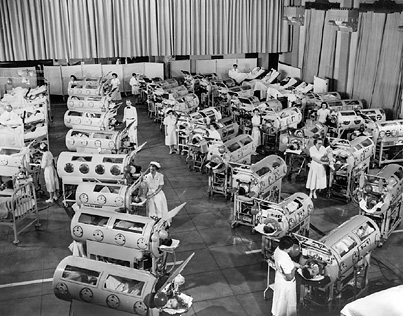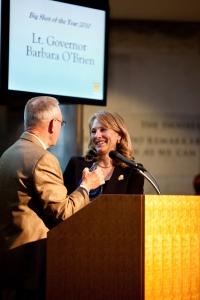In this post, we share notes from our conversation with former Colorado Lt. Governor Barbara O’Brien as she recounted her family’s experience with a vaccine-preventable disease that plagued our nation not long ago.
The Hon. Barbara O’Brien is the president of Catapult, an innovative executive level leadership development program for experienced educators who are eager to create innovative, transformational changes in low-income schools. Prior to leading Catapult, she spent 16 years as President of the Colorado Children’s Campaign and also served as Lt. Governor of Colorado from 2007-2011. Her leadership resulted in the creation of the Colorado Preschool Program and the establishment of Colorado’s first statewide, full-day kindergarten program. She has deep roots in the Colorado community and is passionate about launching leaders who will transform education for our kids now and into the future.
In 1955 a Polio epidemic hit the U.S. What do you remember from this time in your childhood?
I remember my mom calling me from a dark bedroom. My siblings and I thought she was just sick with a cold when we came into the room to see her. When my dad finally came home that night, he found her listless in bed, burning up with a fever. He called a local doctor right away and the doctor said we had to get her to Los Angeles to the polio experts.

Iron lungs in gym Courtesy of Rancho Los Amigos National Rehabilitiation Center
My mother was transferred to L.A. We would soon come to learn that our lives would never return
to their same rhythm. My mother lay in an Iron Lung for a year, and then spent 18 months in the specialist polio hospital Rancho Los Amigos.
What was life like for your family in the 1950s while your mother was in Los Angeles?
My dad was a farmer. He would get up at 4 a.m. every Friday, as usual, to put in a normal work day. Then he would pick up one of the kids and drive late into the night to get to L.A. to see my mother for the weekend. He would leave us with our grandparents who lived there and pick us up for visits throughout the weekend. My dad would rotate us, so I would get to see my mom every third week.
The only way to see my mom in the iron lung was through a mirror. I have strong memories of us talking through the mirror in the hospital.
On Sunday, as the weekend was coming to a close, my dad would make the return drive at 11 p.m. on Sunday to get back to work on Monday for his 4 a.m. wake up to be on the farm.
Can you imagine what it would take to raise us, work on the farm, and still be able to take care of my mother?
What was it like when your mother finally came home?
My mom was finally able to come home after 18 months in the specialized polio hospital. However, she was paralyzed, in a wheelchair, and on a respirator. Our only option was to move in with our grandparents.
Electricity was not entirely dependable during that time, especially in a farming community. Every one of the children had to learn to act when an emergency came up. I learned to handle responsibility and to handle tough situations calmly.
Everything in life had changed. Yet for me, as a young and growing child, this new life became my new normal. Normal for me was learning how to suction phlegm from my mom’s lungs after her tracheotomy, learning how to help run the house, and conversing with adults on a consistent basis. Wonderful neighbors would come sit with my mom to make sure she had company.
Can you talk about how your family made it through this challenging time?
One of the lessons I learned through the experience was the power of a community coming together in tough times. From the moment my mother became ill, our community came together to help. Most memorably, shortly after the doctor told my father that my mother needed to get to LA, we were scrambling to figure out the fastest way to get her there.
Someone in the community called the railroad, and there happened to be another case of polio a few miles away. The railroad put their jobs on hold to put a medical railroad car together, just to pick up my mother and the other man. The local doctor worked the whole way to Rancho Los Amigos to take care of them and keep them alive. Because of so many people, my mother survived.
Throughout this time, neighbors took me, my brother and sister into their own families. They would take me with them for back-to-school shopping with their own kids. My aunt did our grocery shopping. Someone always had to be with my mom—which was hard for my family because my dad had to work and the kids were in school —but so many people helped so that we could do things like normal kids. People just took us in.
How do you think your childhood experiences shaped you?
I was raised by women of strength and courage.
In later years, my grandmother told me that my mother was the most courageous woman she ever met. She shared a small, yet powerful story with me:
One day, as my mother was adapting to her new reality of life, she told my grandmother that she knew people were only coming to visit her out of pity—that they were simply coming to do their part and pay their respects. But she decided that if they did come back to visit it would be because she was the best conversationalist in town.
From that point on, she set out to be the best conversationalist in town. She continued to draw people back, day after day and year after year.
My mother was courageous, inventive and determined. She set up a contraption to turn the pages of books so she could read. She listened to the news every morning. She mentally connected herself to the outer world in every way possible so as not be confined to the physical life in her wheelchair.
I grew up sitting with my mom and her friends in the living room, listening to amazing and interesting conversations – on the hottest new book, interviews on the Today Show, political debates, and more.
We had a home health person, but as the oldest child, I was the person on call for the most part. I spent the majority of my time sitting with and learning from my mom and our neighbors—smart and compassionate women.
I grew up being really comfortable talking to adults. This, I later learned, would be a huge gift.
How do you think your experiences impacted your path later in life?
I never felt traumatized by my family experience growing up. For example, I didn’t go into child advocacy because I felt as if I needed to fill a void in my own life. I came away from the experience with strong acceptance of the reality that things simply go wrong in life.
We all need to be a part of communities that are true communities. Communities that can step up and help when you are dealing with something bigger than what any one person can manage.
This is how I have always thought of immunizations. It often takes everyone in a community to step up in order to achieve a goal. Vaccines depend on herd immunity, and each of us has to contribute to ensure the safety and well-being of our communities. It takes a village to raise a child.
So many diseases that plague our world today are preventable, and the impact of these diseases on individuals, families and communities is immense. I know this from personal experience. All of us can do more. It is each parent’s responsibility to contribute to the whole community by vaccinating their child.
As Lieutenan
